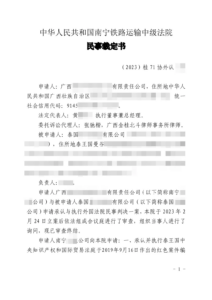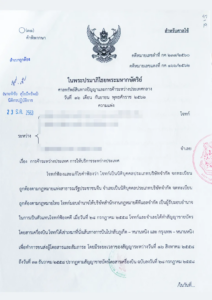On July 3, 2024, the People’s Court Daily, an official media channel of the Chinese judiciary, reported that the China-ASEAN Free Trade Area Nanning International Commercial Tribunal of the Nanning Railway Transport Intermediate Court (Nanning Court) has “recently” made a ruling to recognize and enforce a “civil and commercial judgment” from Thailand, the first time that any Chinese court is known to have recognized and enforced a Thai civil and commercial judgment.
Thai judgment
According to the People’s Court Daily, in July 2015, a travel agency in Nanning entered into an air ticket sales contract with a Thai airline. The contract was executed in Nanning, and the parties agreed that any dispute over the contract would be governed by the court in the place where the Thai airline is domiciled. When disputes happened subsequently, the travel agency filed a lawsuit to the Thai Central Intellectual Property and International Trade Court (Thai Court). In September 2019, the Thai Court issued civil judgment GorKor 166/2562, ordering among others that the Thai airline pay RMB 18,002,676 plus interest to the travel agency.
Although the Thai airline may have enforceable assets in China by virtue of its multiple branch offices in the country, the absence of a bilateral treaty between China and Thailand on mutual recognition and enforcement of civil and commercial judgments means that the travel agency faced the predicament of a “paper judgment” which it is unable to practically enforce. Eventually in February 2023, the travel agency applied to the Nanning Railway Transport Intermediate Court for recognition and enforcement of the Thai judgment.
Reasoning
Based on People’s Court Daily’s report, the judge interviewed commented that “in the absence of any bilateral treaty between China and Thailand on the recognition and enforcement of each other’s civil and commercial judgments and given that China and Thailand are not parties to the same international convention on the recognition and enforcement of civil and commercial judgments, the key issue in this case is to determine whether presumptive reciprocity exists (between China and Thailand)”. After reviewing the criteria for establishing presumptive reciprocity, the Nanning Court ruled to recognize and enforce the Thai judgment based on the consensus on presumptive reciprocity enunciated in the Nanning Statement (南宁声明) issued at the second China-ASEAN Justices Forum held in June 2017.
Commentary
In the absence of any applicable bilateral treaty or international convention, reciprocity is one of the requirements under Chinese law before a foreign judgment can be recognized and enforced in China. Traditionally, Chinese courts have taken a strict approach to reciprocity such that only de facto reciprocity counts. In other words, where all other requirements have been met, a Chinese court will only recognize and enforce a judgment from a foreign jurisdiction if that foreign jurisdiction has previously recognized and enforced a Chinese judgment. In recent times, however, a relaxation in attitude can be discerned. For example, in July 2021, the Shanghai No. 1 Intermediate People’s Court recognized a monetary judgment by the Singapore High Court by stating that de jure reciprocity exists between China and Singapore in foreign judgments recognition and enforcement (de facto reciprocity has already been established between the two jurisdictions before July 2021).
On the other hand, the Nanning Statement, a non-binding consensus adopted by judicial representatives of China and various ASEAN countries in June 2017, mentions that where there is no treaty between two countries, the court addressed (in this case, the Nanning Court) will “presume” the existence of a reciprocal relationship, provided the courts of the other country (in this case, the Thai court) have not refused to recognize or enforce judgments from the country of the court addressed (in this case, Chinese judgments) on the ground of lack of reciprocity.
This ruling by the Nanning Court is hailed as a “milestone” in supporting the “Belt and Road Initiative” and the “soft circulation” of the rule of law across borders, but it remains to be seen whether Thai courts will now “return the favor” by recognizing and enforcing Chinese judgments when such applications appear before them. This is because under Thai law foreign judgments are not enforceable although they can be used as evidence in Thai proceedings. The conclusion by the Nanning Court that presumptive reciprocity exists is thus arguably untenable. However, since the actual text of the Nanning Court ruling is not publicly available, it is not possible, at the moment, to know the detailed reasoning by the Nanning Court. We can only continue to observe further developments in this area.
More about ABLI’s work on the recognition and enforcement of foreign judgments in Asia can be found here and here.
Images of the Nanning Court ruling (left) and the Thai judgment (right) courtesy of the WeChat account of Guangxi courts. We also thank Dr Meng Yu for alerting us to this development.
Whilst every effort has been made to ensure that the information contained in this update is correct, the Asian Business Law Institute disclaims all liability and responsibility for any error or omission in this update, and in respect of anything, or the consequences of anything, done or omitted to be done by any person in reliance, whether wholly or partially, upon the whole or any part of the contents of this update.




![[Interview] Landmark Indonesian Recognition [Interview] Landmark Indonesian Recognition](https://abli.asia/wp-content/uploads/elementor/thumbs/Interview-Landmark-Indonesian-Recognition-r77cnxouwhwh3r5ch7omm9j9804fq32n59ungqj82o.jpg)


